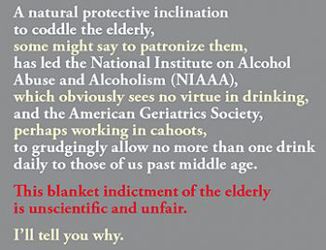Aging Gracefully
Like bottles of wine, even in the same case, people age differently. Time may amplify what were once insignificant defects. There is, however, now a large and increasing number of very fit, healthy and active people well beyond the age of 6O. An elderly person who drinks, say, wine in moderation regularly is likely to both tolerate the alcohol better and benefit from it more than a young adult naive to drinking. The older person is also far more likely to handle alcohol responsibly.
Two recent sources have served well to clarify the medical issues involved in the effects of drinking upon those of age. We are, of course, focusing on moderate drinking, for excess is harmful at any age. We must also exclude from our generalizations individuals with specific contraindications and those who are exceedingly frail. As always, do not take any of this as individually specific medical advice: only one’s own physician is qualified to offer that.
Erik Skovenborg, MD, a Dane, a member of the Scandinavian Medical Alcohol Board and an avid student of the health effects of drinking, addressed the XXX World Congress of the International Organisation of Vine and Wine (OIV) in Budapest in June, 2OO7, on “Wine – Bane or Boon for the Elderlyâ€. He pointed out that the decrease of the volume of total body water (TBW) with age, a foundation stone of recommendations by the NIAAA, the Geriatrics Society and the US departments of Agriculture and Health and Human Services, has been much exaggerated. (Less TBW would mean less space in which to dilute the alcohol.) “TBW volume, on average, maintains a reasonable degree of stability in men and women through a large portion of adulthood.†“TBW volume was not significantly different in the young and old subjects . . .â€
Skovenborg cited research demonstrating that age and gender differences in blood alcohol concentrations can be eliminated when the alcohol is ingested with a meal. He counseled us to consider the balance of potential harm versus potential benefit from drinking moderately, and noted that, “tremendous heterogeneity within the group considered ‘elderly’†may cause misleading generalizations. Using data on the relation between alcohol consumption and risk of death at various ages, Skovenborg showed that the upper limits of alcohol consumption at which risk is least actually rises with age in both men and women. He concluded stating that “the groups most likely to benefit from drinking small amounts of alcohol are older people at high absolute risk of coronary heart disease and ischemic stroke and at low absolute risk of injury, cirrhosis and other alcohol-related diseases†and that older people should not be advised to drink for health, but rather to “drink – moderately – to their health!â€
The second source to which I alluded is the report, “What Level of Alcohol Consumption is Hazardous for Older People? Functioning and Mortality in US and English National Cohortsâ€, by Iain Lang, PhD, Jack Guralnick, MD, PhD, Robert B. Wallace, MD, and David Melzer, MD, PhD, of the Peninsula Medical School, Exeter, UK, the National Institute on Aging, Bethesda, Maryland, and the College of Public Health, University of Iowa, Iowa City. It was published in the January, 2OO7, issue of the Journal of the American Geriatric Society. Studying 13,333 individuals aged 65 and older for four to five years, the group began by reviewing previously reported physiological changes suggesting increased sensitivity to alcohol in older people, including declining body water content, higher blood alcohol concentration after a standard dose, and decrease in the body’s ability to adapt to the presence of alcohol. They found in their large study group, however, like other recent reports in middle-aged and in older individuals, both men and women, that drinking more than one or two per day was associated with no detriments to activities of daily living, mental function or mortality. In fact, these moderate drinkers scored better than abstainers by most measurements. The results indicate that, other factors being equal, older folks may drink as much as they did when younger, always within sensible limits and situations. Of course, advanced age is not a valid health reason to begin drinking. Do not drink to medicate life, but to enrich it.
My own reviews of relevant medical research echoes that just cited. Let us, therefore, agree with Thomas Moore that, “Age still leaves us friends and wine.â€

